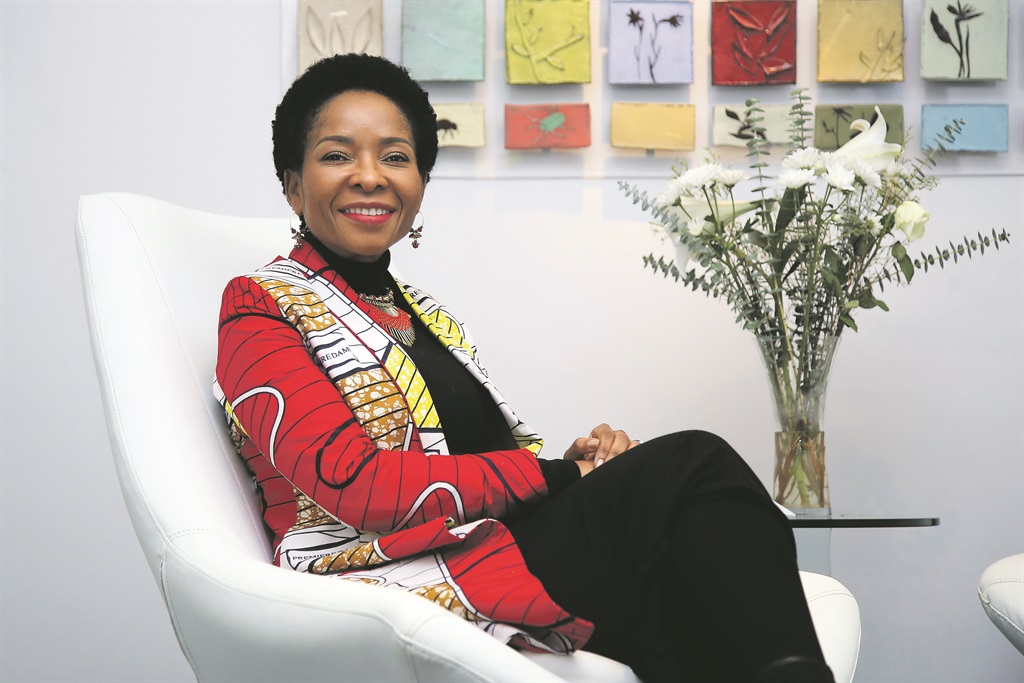
If success really is the new cool, then the new vice-chancellor of UCT will be a trendsetter for the next generation of academics
As a teenager, Professor Mamokgethi Phakeng shared a school desk with former Eskom chief executive Brian Molefe.
It was at Thuto Thebe Middle School in Ga-Rankuwa, outside Pretoria. They did not swap sandwiches at break time – there were no sandwiches as their parents were too poor.
As she assumes the position of vice-chancellor of the University of Cape Town (UCT), Phakeng (51) is pledging 10% of her salary to fund black postgraduate students, which amounts to R200 000 a year.
She is also forfeiting her inauguration ceremony.
“The basic thing is, it’s not consistent with my values to spend money when there is such a shortage of it,” she says.
The effervescent maths education professor inherited the title from Max Price on July 1, at a time when funding uncertainty is casting a cloud over South Africa’s tertiary landscape.
This follows last year’s move by former president Jacob Zuma for free education for students from low-income households, leaving university bosses scratching their heads over the funding deficit.
“At the university, the academic sector has been on austerity,” says Phakeng. “They’ve had to cut costs and cut posts, and then I get a million rands for a celebration? No.
“So we’re planning how to achieve the things we need to achieve with an inauguration, but without a party.”
Phakeng does not pull any punches, despite detractors whispering that she lacks the necessary experience to head Africa’s top university.
“Being successful is the new cool,” rings her mantra.
Last month, UCT clinched number 191 in this year’s QS World University Rankings, the highest of all universities in Africa.
Its decolonial winter school programme that took place from June 24 to 30 made headlines when a group of students tried to host a “people of colour only” dinner at the event, saying it would be “a safe space”.
“Yes, I inherited that from Max Price,” sighs Phakeng. “It was his last gig, if you want.”
Phakeng says the university’s executive will discuss what it means to drive transformation and build an inclusive culture.
“The thing is, the decolonisation school was an academic environment that’s supposed to be transformative in and of itself,” she says.
“Per definition, you want to attract people of different races. So when you exclude people in certain sessions with no satisfying explanation, it doesn’t gel.”
We’re seated in her office in the Bremner Building, where her desk brims with flowers and cards from well wishers.
“Thanks for keeping it real,” reads one.
It’s lunch time, and Phakeng is eating a banana.
“First of all, I am not opposed to spaces for specific groups of people. I understand there is a need for them,” she says.
“In fact, I had one last week. I had a meeting with just black African, coloured and Indian academics; young academics. It was important and relevant because we’ve got this funding available to black African, coloured and Indian students. It’s the middle of the year and they haven’t used all of this funding. So I called them to say: ‘Guys, this money isn’t moving, what’s wrong with you?’ There was no point in inviting white people to this meeting, they would just be wasting their time.”
Phakeng shrugs, then continues: “In addition, the very phrase ‘people of colour’ is not innocent, it’s loaded in controversy. Using that phrase puzzled me. There are many black African people who don’t like to be addressed as people of colour.”
Over the years, Phakeng’s research focused on mathematics in multilingual classrooms, specifically the low performance of South African pupils taught in a language that is not their own.
Studying at Wits University, it was Phakeng’s supervisor, Professor Jill Adler, who inspired her to become an academic.
“It was how Jill interacted with us. She made you feel that your thinking really mattered, you know. Jill explained to me: ‘The university doesn’t tell you what research to do, you pursue questions that are of interest to you.’ So I looked at her and thought: ‘Wow, I can do that!’” recalls Phakeng.
“I was doing a master’s [degree] with her as supervisor. When that was done, I asked her what it would take to have her job. I said: ‘No, no, not your actual job! But your kind of job.’ She told me I needed a PhD, so I took a one-year break and then went back to do a PhD. Before Jill, academics were quite removed. But she made it look like a career that one could get into.”
Today, Phakeng holds an excellent B1 rating with the National Research Foundation of SA, meaning her work “enjoys considerable international recognition”.
She gets up at 2am to reach her desk at 4.30am, or 5am at the latest.
Her social media following will attest that she keeps fit through gym classes and hikes around Cape Town to clear her head.
It’s hard to imagine that her figure birthed five children, now adults. One of her children tragically passed away in a car accident in February.
Phakeng has two tattoos, the word “forgive” on her right arm and “believe” on her left – references to her Christian faith. She got inked in 2015, a year before first starting at UCT.
“I did that at a time when things were going well. I like doing things that remind me to keep my feet on the ground,” she says.
“All that I am today is because I was forgiven. As a sinner, I was forgiven. Also, tattoos are a conversation starter. It makes it easy for me to tell people about my faith.”
Phakeng likes to impose challenges on herself, like the time she enrolled at Johannesburg’s Woodmead Golf Club for golf lessons for a year.
“I’ve done crazy things to humble myself, like enrol for golf. I wasn’t great, but I did it to do something that is hard, something to challenge myself. To remind myself that I’m human and can’t nail everything, and that it’s okay. I did it for a whole year, with lessons once a week, then gave it up.”
Her memories of Molefe?
“He was very smart and confident, outspoken. He was on the debating team,” she says.
“His dad was a professor. These were people my parents really looked up to. His parents were a little older than mine, not too much, about 10 years.”
Phakeng’s mother, Wendy, was a domestic worker and later a teacher. Her father, Frank, was one of South Africa’s first black radio presenters at the SABC.
At the Bremner Building, a knock on Phakeng’s door indicates that her next commitment is due.
She has to head off to upper campus, where she’s doing a welcome speech before delegates at a cybersecurity conference.
She gets up, smiles for photographs, then rushes off on high-heeled boots.




 Publications
Publications
 Partners
Partners








